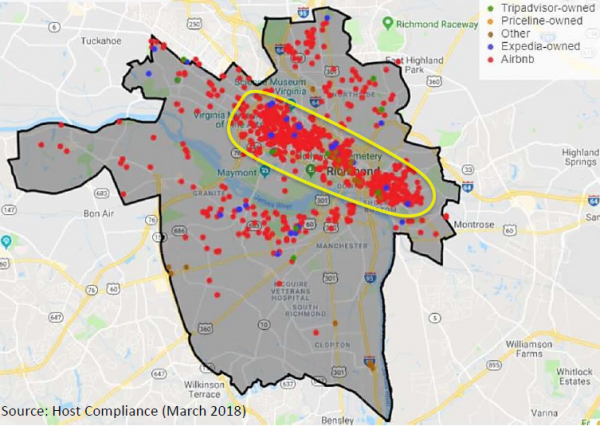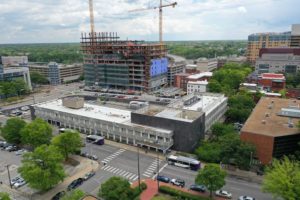
A map showing short-term rental operations in March of 2018. (Courtesy Richmond Planning & Development Review)
Five years after the state allowed localities to do so, the City of Richmond now has new rules lined up to make short-term home rentals legal in the city, though not all rentals will be allowed as they are operating today.
Richmond City Council on Monday adopted the latest version of a years-in-the-making proposal to allow the Airbnb-style rentals in certain areas of the city, so long as the rentals are registered and an operator’s primary residence, meaning the property where an operator resides at least half the year.
The primary residency requirement had been a point of contention for operators who rent out more than one property, as the new rules, which take effect July 1, would no longer allow them to do so. City officials say the requirement is needed to prevent the possibility of operators buying up multiple properties in residential districts and using them as essentially mini-hotels.
Describing the proposal as a starting point, officials said they would revisit it after a year to see how operators perform and tweak the proposal as needed.
The city also would need to decide whether rentals would be subject to the city’s transient occupancy tax, which is not being imposed on primary residence rentals initially. Officials said the reason for that is because costs to enforce the new rules were expected to outweigh revenue from the tax.
The city had previously proposed charging an 8 percent transient occupancy tax on some rentals, with only operators of properties with four or more bedrooms required to remit the tax. That proposal was taken out as the policy was tweaked over the past year. Business licenses and personal property taxes would not apply to the rentals.
Council member Stephanie Lynch, who was the sole dissenter in Monday’s vote, argued that the city risked losing potential tax revenue from operators who, not allowed to rent multiple properties, may no longer operate in the city in a year’s time. Lynch requested additional time to further refine the rules, but a majority of council voted in favor of putting the starter policy on the books.
Michael Jones abstained from the vote. Reva Trammell was absent from the meeting.
The city’s policy comes weeks after neighboring Henrico County adopted its own rules, which do impose an 8 percent transient occupancy tax – the same rate charged for hotel and motel room stays. Registration with Henrico comes with a $200 annual fee, and the tax applies to the rental charge for a room or residence occupied 30 or fewer consecutive days.
The city’s policy requires a biennial permit, at a cost of $300, for anyone looking to rent out a property for less than 30 days at a time. The policy no longer includes a restriction on the number of nights a dwelling could be rented per year – previously proposed at 180 nights a year.
First rolled out last year, the city policy was revised over the course of several months with public input from surveys and community meetings. The Planning Commission endorsed the latest version earlier this year, and additional meetings with stakeholder groups were held before council considered the policy last month and deferred a vote to Monday’s meeting.

The Public Safety Building as viewed along Ninth Street, with the under-construction VCU Health outpatient building looming behind it. (Capital City Partners)
Surplus designation approved
In other business, council approved a surplus property designation for the Public Safety Building at 500 N. 10th St. The designation allows the city to pursue a formal request for proposals for development of the 3-acre site, which is one of several city-owned properties once tied to the Navy Hill project.
The other properties were removed from the surplus designation to give the city time to complete a small area plan for those properties, and to free up the city to pursue an RFP specific to the Public Safety Building, which is the focus of one of two development proposals the city has received since Navy Hill was voted down.

A map showing short-term rental operations in March of 2018. (Courtesy Richmond Planning & Development Review)
Five years after the state allowed localities to do so, the City of Richmond now has new rules lined up to make short-term home rentals legal in the city, though not all rentals will be allowed as they are operating today.
Richmond City Council on Monday adopted the latest version of a years-in-the-making proposal to allow the Airbnb-style rentals in certain areas of the city, so long as the rentals are registered and an operator’s primary residence, meaning the property where an operator resides at least half the year.
The primary residency requirement had been a point of contention for operators who rent out more than one property, as the new rules, which take effect July 1, would no longer allow them to do so. City officials say the requirement is needed to prevent the possibility of operators buying up multiple properties in residential districts and using them as essentially mini-hotels.
Describing the proposal as a starting point, officials said they would revisit it after a year to see how operators perform and tweak the proposal as needed.
The city also would need to decide whether rentals would be subject to the city’s transient occupancy tax, which is not being imposed on primary residence rentals initially. Officials said the reason for that is because costs to enforce the new rules were expected to outweigh revenue from the tax.
The city had previously proposed charging an 8 percent transient occupancy tax on some rentals, with only operators of properties with four or more bedrooms required to remit the tax. That proposal was taken out as the policy was tweaked over the past year. Business licenses and personal property taxes would not apply to the rentals.
Council member Stephanie Lynch, who was the sole dissenter in Monday’s vote, argued that the city risked losing potential tax revenue from operators who, not allowed to rent multiple properties, may no longer operate in the city in a year’s time. Lynch requested additional time to further refine the rules, but a majority of council voted in favor of putting the starter policy on the books.
Michael Jones abstained from the vote. Reva Trammell was absent from the meeting.
The city’s policy comes weeks after neighboring Henrico County adopted its own rules, which do impose an 8 percent transient occupancy tax – the same rate charged for hotel and motel room stays. Registration with Henrico comes with a $200 annual fee, and the tax applies to the rental charge for a room or residence occupied 30 or fewer consecutive days.
The city’s policy requires a biennial permit, at a cost of $300, for anyone looking to rent out a property for less than 30 days at a time. The policy no longer includes a restriction on the number of nights a dwelling could be rented per year – previously proposed at 180 nights a year.
First rolled out last year, the city policy was revised over the course of several months with public input from surveys and community meetings. The Planning Commission endorsed the latest version earlier this year, and additional meetings with stakeholder groups were held before council considered the policy last month and deferred a vote to Monday’s meeting.

The Public Safety Building as viewed along Ninth Street, with the under-construction VCU Health outpatient building looming behind it. (Capital City Partners)
Surplus designation approved
In other business, council approved a surplus property designation for the Public Safety Building at 500 N. 10th St. The designation allows the city to pursue a formal request for proposals for development of the 3-acre site, which is one of several city-owned properties once tied to the Navy Hill project.
The other properties were removed from the surplus designation to give the city time to complete a small area plan for those properties, and to free up the city to pursue an RFP specific to the Public Safety Building, which is the focus of one of two development proposals the city has received since Navy Hill was voted down.